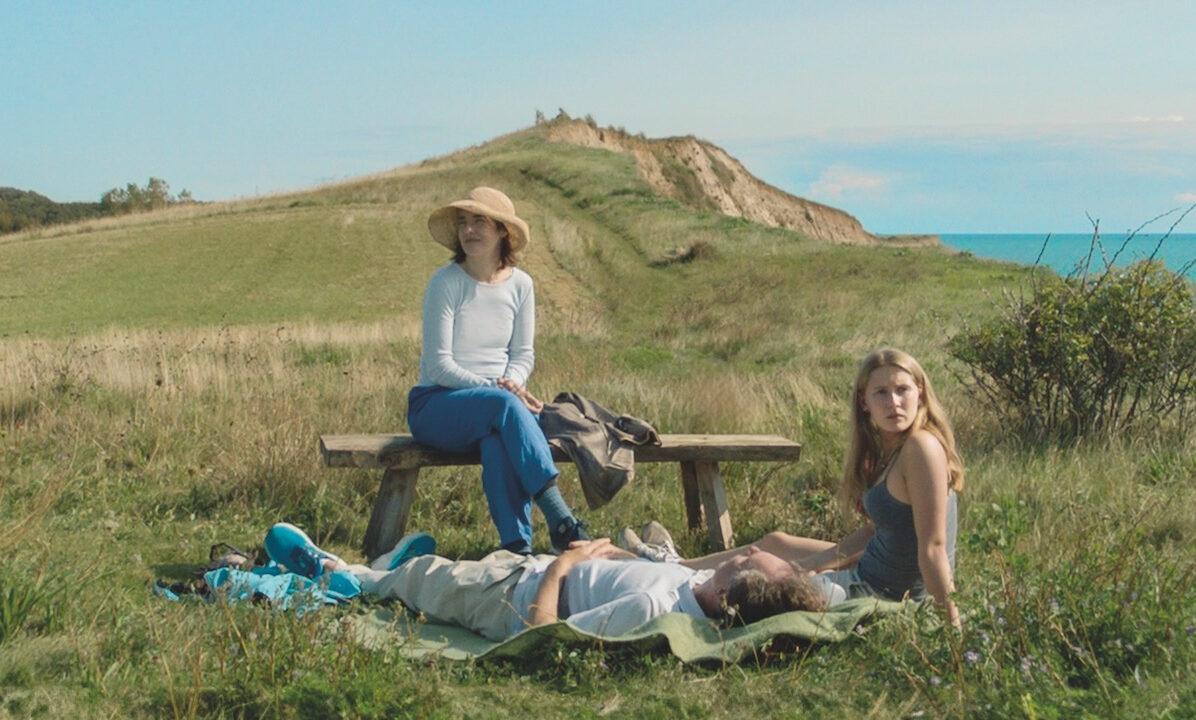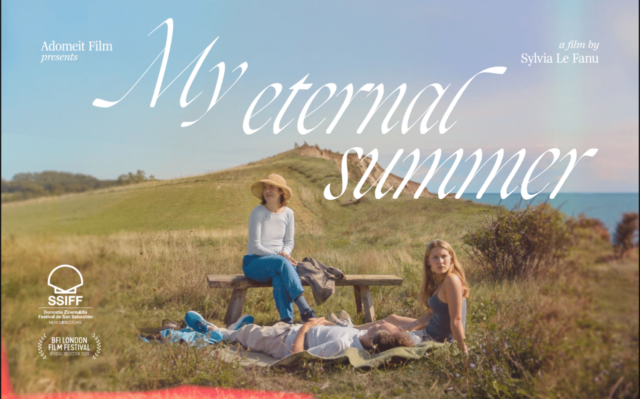“It’s probably one of those films that was made more out of a kind of necessity”: Sylvia Le Fanu on My Eternal Summer at London Film Festival 2024

With delicate shifts in familial bonds and the serene, indifferent beauty of nature, Danish filmmaker Sylvia Le Fanu’s feature debut offers a coming-of-age story rendered with an unusually subtle touch for the genre. Following the emotional journey of 15-year-old Fanny (Kaya Toft Loholt) as her family navigates the final days of her terminally ill mother, Karin (Maria Rossing), in a rustic summer cottage by the sea, the film opens deep within the fifth and final stage of grief – acceptance. This stage is portrayed with quiet restraint, as the unspoken acknowledgement of Karin’s inevitable death is set against the vibrant bloom of the summer season. Here, acceptance is not a moment of clarity or resolution, but rather a series of subtle, almost imperceptible shifts in Fanny’s demeanour and actions, revealing a quiet transformation beneath the surface.
Ahead of its release at the London Film Festival, Le Fanu joined The Upcoming to discuss the layered nuances that form My Eternal Summer – from Fanny’s recent graduation from the Folkeskole, a cornerstone of the Danish school system to her cinematic influences from the works of Maurice Pialat and Mia Hansen-Løve.
Would you like to start by sharing what My Eternal Summer is about and what people can expect when they watch it?
So the film is about a young girl, 15-year-old Fanny, who, together with her parents, will be spending the summer in their summer house. And while they do their routines as every summer, everything in a way is different because this is going to be her mother’s last summer. So it’s a film about grieving before, in a way, grieving before death.
What made you decide to make this your feature debut?
It’s based on a personal story. I lost my mother at a young age, and it’s probably one of those films that, maybe, was made more out of a kind of necessity than actually wanting to make the film, in a way. It’s maybe even the reason that I’m making films in the first place – to try to express something about this experience. And it was the best way I knew how.
Aside from your own story, what are some other sources of inspiration, such as other films, books or even stories that particularly influenced your process?
I mean – I think I was. My father once sent me the film À Nos Amours (1983) by Maurice Pialat. It’s a French film from the 80s also about a young girl, 16 years old, who’s exploring life and love. And I just think I was really impressed with how this kind of coming-of-age theme was made so seriously, but also with such delicacy in it inspired me in a way, too. To take this young girl seriously and look at her and all her complicated ways. So that film is maybe the most specific, but generally, I love French cinema. I love the cinema of Mia Hansen-love, who also works in a kind of very intuitive and naturalistic way and without too much sentimentality.
You co-wrote the screenplay for the film – were there any scenes that had a different effect or impact when you translated them to the camera?
I’m sure there must have been many scenes, because of course that’s always the case that the material is constantly changing. I mean, the first cut was four hours, meaning we cut out a lot. So probably among a lot of what we cut out were scenes that just didn’t work for some reason or other. I think often you find out that you repeat yourself a lot because you’re there’s something you want to explore, and then you do it in many different ways, but it’s the same thing you’re doing. So I can’t say specifically a scene in the film that is very different. I can just say that sometimes there were small gifts that weren’t even in the script, that just turned up because an actor has an improvisation or just someone, something inspires and you grab the moment. There was lots of that here and there.
Speaking of actors, casting child actors is always a challenging task. For such a character-driven story, how did you know that Kaya was the right actor to play Fanny?
Kaya auditioned for the first time when she was 13. So in the very first year we were developing the script, we started doing the casting just to see, because we knew it was going to be a long process. And so time worked to our advantage because she was 15 when we ended up shooting. I just think it’s the sheer stamina of continuing to go to these castings, and she just has a very natural talent and is super intelligent. I think it was important that I could have these conversations about difficult topics with her. I mean, we tested maybe 500 plus girls. So she was the one in the end.
And speaking of Fanny, her graduation from Folkeskole seems very important. And could you maybe speak a little more about that? For people who don’t really understand the Danish education system?
Yeah. So you did the research, because, of course, that for an international audience is not obvious. The first opening scene is a scene of her finishing this primary school folk school, and it’s a tradition that you throw candy to the small kids. I like the idea of it being a coming-of-age. I thought it was a clear transition point, you know, to finish this, it’s a ten-year school before going to high school or gymnasium. So that’s at least, for Danes, it’s a milestone. So I felt that was a good starting point. And then it goes through the summer and, without spoiling it, the film finishes when she starts a new school.
The story, characters and relationship dynamics in the film have a very universal appeal, and the translation, including the lyrics and the song titles, are excellent. But aside from the Folkeskole, are there any other subtle details or nuances that you would love for international audiences to take note of while they watch it?
That’s a very good question. I don’t know, because now you [already] mentioned the Folkeskole school. Then of course, [there’s] the school she goes to afterwards, an Efterskole, which is also a specific Danish tradition. It’s almost like a prep school before Gymnasium, where it’s like it’s a boarding school. That’s where we end in the film, and I think most young kids who have gone to Efterskole, it’s a very special experience of being – it becomes like a new family. It’s something I didn’t go to after school myself, but what I can understand is it’s a very heartwarming experience. So maybe that would be a reference otherwise.
To end things, could you speak a bit more about your decision to leave Fanny’s mother’s illness unnamed?
That’s also a good question. I didn’t think it was necessary, I don’t know. It never came up, and I just generally have a thing about exposition that these sorts of details, if it came up naturally – it wasn’t that I wanted it to be any secret. It’s just, so like, imagine we’re with the family the whole time, in which context would a family within the family talk about? “So what are we going to do about your cancer?” You know what I mean? So I didn’t want scenes like that. And I thought maybe in a way, it doesn’t matter, because we understand in a way what it’s about. That was, I guess, my feeling. We did have a scene, one of these scenes that was cut out, where exactly there was this sort of dialogue with another character where she was explaining. The scene wasn’t very good. We didn’t need it.
Watch the interview here:
Christina Yang
My Eternal Summer does not have a release date yet.
Read more reviews from our London Film Festival coverage here.
For further information about the event visit the London Film Festival website here.
Watch the trailer for My Eternal Summer here:
























Facebook
Twitter
Instagram
YouTube
RSS